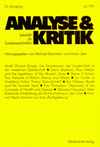ohne Titel

1979 (1) Issue 2
Table of Contents
Title: Zum Programm einer kritischen Sozialwissenschaft - Theorie der gerechten Gesellschaft und Ideologiekritik
Author: Michael Baurmann / Anton Leist / Dieter Mans
Page: 105-124
Abstract: Critical social science has to acknowledge that every fundamental critique of society implies the justification of alternative norms and institutions. Several current objections against such an explicitly normative understanding of critical social science are discussed. The following outline of a theory of a just society tries co meet two demands: the rational consensus of all individuals concerned and the satisfaction of individual interests. In societies characterized by class struggles, however, these two aims turn out co be incompatible. Therefore an ethical realist approach is offered which takes into account the clarification and normative reinterpretation of interests. The tools of analytic philosophy can be given new application in combina-tion with an analysis of interests under the title of a critique of ideology.
Title: Political Institutions as Means to Economic Justice: A Critique of Rawls, Contractarianism
Author: Joseph D. Sneed
Page: 125-146
Abstract: It is argued that John Rawls' theory of social justice as well as the contract argument for it are misleading, if not actually mistaken, in that they appear to take institutional features of societies as fundamental objects of moral evaluation. An alternative view is expounded. Principles involving institution as features are only contingently related to principles involving the distribution of things people care about. These distributions are taken as the fundamental objects of moral evaluation. Social, political and economic institutions are means to achieve more desirable distributions. It is argued that the alternative provides a more accurate reconstruction of the moral foundations of social-democratic liberalism than does Rawls' theory.
Title: Funktionale Erklärungen bei Marx
Author: Wolfgang Detel
Page: 147-163
Abstract: In the following attempt at a further clarification of the methodological aspects of Marxian theory construction it is demonstrated that central arguments in the first part of the Kapital, especially the description of the development from simple to capitalist commodity production, can be analysed as functional explanations in the modern logical sense. At the same time it becomes clear that some questionable conclusions which have been arrived at on the ba-sis of this description, e.g. the development of capitalism being a necessary condition for the later formation of socialism, can be understood as results of certain methodological defects in Marx, functional explanations.
Title: Modellkonstruktion und empirische Überprüfbarkeit in Marx' "Kapital"
Author: Ulrich Steinvorth
Page: 164-181
Abstract: One of the first objections raised against Marx, Kapital was that it was an idealistic construction apriori of capitalist economy. Since Marx agreed that his book could seem to be so, we may assume that the analyses of Kapital are not only empirical. I try to show that (1) the analyses of the first chapters of Kapital give a conceptual construction of a model of commodity exchange made up both of generally recognized and of new definitions of commo-dity exchange, (2) that the model cannot be used for predicting the end of capitalist economy but that (3) it can be applied to reality because (a) the generally recognized definitions correspond to the ordinary usage of the words, (b) the new definitions are in accordance with true empirical statements about capitalist exchange, (c) the model has allowed true predictions about capitalist economy to be deduced, and (4) that therefore it can be used as a reason for putting an end to capitalist economy.
Title: Die linke Ecke des Wiener Kreises. Bemerkungen zu A. Beckermanns "Logischer Positivismus und radikale Gesell-schaftsreform" (ANALYSE & KRITIK 1/79)
Author: Rudolf Lüscher
Page: 182-191
Abstract: Beckermann's belief in a "direct connection" between Logical Empiricism and socialist politics is unjustified: (I) Logical Empiricism supports - if anything - 'rational', i.e. non-metaphysically grounded political positions, including non-socialist and authoritarian ones. (11) Logical Empiricism offers instruments to anybody willing to talk rationally about politics, but it cannot urge anybody to become politically active. (III) The only systematic attempt to develop a politically relevant sociology within the Vienna Circle, i.e. Neurath's, is at best methodologically inconsistent and at worst pro-authoritarian.
Title: Logischer Empirismus und normative Entscheidungstheorie
Author: Wolfgang R. Köhler
Page: 192-199
Abstract: Logical Empiricism, i.e. its non-cognitivism, does not destroy practical rationality because it is compatible with a rational decision on normative questions by way of consequen-tialist reasoning according to decision theory. It is argued that the contention that Logical Empiricism destroys practical rationality is based on a confusion of a rational decision on normative questions with the interpretation of the meaning of the answers to these questions. It is further argued that a rational decision on normative questions is only possible as far as the normative status of actions is concerned. It is not possible as far as the evaluative premises about basic values are concerned. Finally it is said that a rational decision on normative questions is principally deductive. Good-reason's-approach and practical syllogism are therefore only enthymematic and transformable into logical deduction. Of course, proving basic values or moral principles by way of logical deduction is both as impossible as needless.